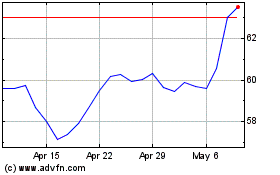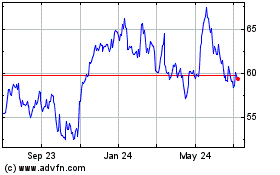Today's Top Supply Chain and Logistics News From WSJ
December 08 2017 - 7:19AM
Dow Jones News
By Brian Baskin
Sign up: With one click, get this newsletter delivered to your
inbox.
Some of the first electric trucks to hit the road may be hauling
cases of beer. Anheuser-Busch has preordered 40 of Tesla Inc.'s
electric Semi trucks, the WSJ Logistics Report's Jennifer Smith
writes, which the company says are well-suited for making short
shipments to wholesalers. Anheuser-Busch, the U.S. subsidiary of
Anheuser-Busch InBev, has a history of being first in line for new
transportation technology, which it sees as a way to reduce the
company's fuel costs and vehicle emissions. Investments include
compressed natural-gas delivery trucks and hiring a driverless big
rig to make a supply run in Colorado last year. But though
Anheuser-Busch's order is one of the biggest to be made public
since Tesla unveiled the trucks last month, the company says it's
too soon to predict an all-electric future. While the Tesla's
500-mile range is less of an issue for beer trucks making regional
deliveries, the heavy battery needed to power the vehicle could
force electric big rigs to carry lighter loads.
Dockworkers and East Coast port employers entered negotiations
this week hoping to agree on an extension to a contract set to
expire next September. But instead the talks exposed deep rifts
that could point to a rocky path to labor peace for ports from
Maine to Texas. Union officials ended the meeting early, citing
disagreements over port automation, a sore subject for the
International Longshoremen's Association. ILA leaders fear
driverless forklifts and artificial intelligence will replace many
port jobs, as they have already in many European container
terminals. Both sides have much to lose if they fail to reach an
agreement. Cargo movement came to a virtual standstill at West
Coast ports in late 2014 and early 2015 amid protracted contract
negotiations, leading many shippers to reroute freight away from
the region. East Coast ports and dockworkers risk the same fate if
they can't at least project the appearance of harmony - especially
since negotiators on the West Coast in August agreed to extend
their contract through 2022.
The tax bill working its way through Congress is designed to
lower corporate tax burdens, but some logistics and transportation
companies worry they might be left out in the cold. The Senate
version of the legislation does not include many family-owned
businesses among the types of corporations subject to a lower tax
rate, the WSJ's Siobhan Hughes writes. Companies structured as
"electing small business trusts," or ESBTs, are particularly
vulnerable, as they would pay 10% to 20% higher taxes than
competitors that qualify for reduced rates on "pass-through"
income. Small, family-run businesses are common in many corners of
the logistics sector, and some of the industry's best-known names,
including truck-stop chain Love's Travel Stop, are set up as
trusts. Sen. Ron Johnson, (R., Wisc.) is pressing for the
conference committee to give trusts a lower rate in the final
version of the bill that will be voted on by the House and Senate.
If he fails, the resulting legislation could be "potentially
devastating," the chairman of one packaging manufacturer says.
SUB-SECTION HED
The demise of King Coal is working its way up the power supply
chain. General Electric Co. is cutting 12,000 jobs in its power
division, the WSJ's Thomas Gryta reports, after a big bet on
turbines for coal and gas-fired plants ran into the reality of
declining demand for conventional power fuels. GE's turbines
generate a third of the world's electricity. But future demand lies
with renewables, which the International Energy Agency predicts
will generate 40% of power by 2040, compared with 24% today. Wind
and solar arrays don't need turbines, which has left GE with extra
inventory and sagging profits, and seemingly little choice but to
shrink its power business to match the darkening outlook for fossil
fuels. GE is investing in renewables, selling about $9 billion in
wind turbines last year. But expansion into the booming solar
market will be tough, as Chinese companies dominate the market for
panels.
QUOTABLE
IN OTHER NEWS
The European Union will more closely monitor auto makers and
levy bigger fines for failing to comply with emissions tests.
(WSJ)
U.S. household net worth rose to a record $96.939 trillion in
the third quarter. (WSJ)
U.S. jobless claims fell to a seasonally adjusted 236,000 in the
week ended Dec. 2. (WSJ)
The U.S. International Trade Commission issued final tariffs of
20% or more on Canadian lumber. (WSJ)
Caterpillar Inc.'s railcar unit plead guilty to charging
customers for unnecessary repairs and dumping parts in the ocean to
hide evidence. (WSJ)
Dollar General says it will open 900 stores and remodel 1,000
existing locations next year. (Chain Store Age)
Honeywell is taking a 25% stake in Chinese supply chain software
provider Flux Information Technology. (Reuters)
Fetch Robotics raised $25 million to further development of its
warehouse robots. (DC Velocity)
More small trucking fleets are equipping vehicles with
electronic logs ahead of new rules requiring the devices.
(Commercial Carrier Journal)
Driver turnover at large truckload fleets rose in the third
quarter, the American Trucking Associations said. (Transport
Topics)
U.S. intermodal rail volumes rose 3.8% in November compared with
a year earlier. (Progressive Railroading)
Air freight companies expect strong growth to continue well into
next year. (The Loadstar)
Freightos will estimate the carbon footprint of various shipping
modes and routes available on the freight pricing platform. (Air
Cargo World)
A container ship broke free from its terminal in South Boston
and damaged a pier. (WHDH)
ABOUT US
Brian Baskin is editor of WSJ Logistics Report. Follow him at
and follow the entire WSJ Logistics Report team: @PaulPage ,
@jensmithWSJ and @EEPhillips_WSJ. Follow the WSJ Logistics Report
on Twitter at @WSJLogistics.
,
Write to Brian Baskin at brian.baskin@wsj.com
(END) Dow Jones Newswires
December 08, 2017 07:04 ET (12:04 GMT)
Copyright (c) 2017 Dow Jones & Company, Inc.
Anheuser Busch Inbev SA NV (NYSE:BUD)
Historical Stock Chart
From Mar 2024 to Apr 2024

Anheuser Busch Inbev SA NV (NYSE:BUD)
Historical Stock Chart
From Apr 2023 to Apr 2024
